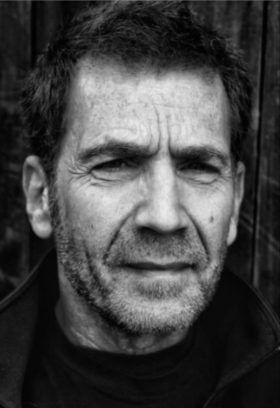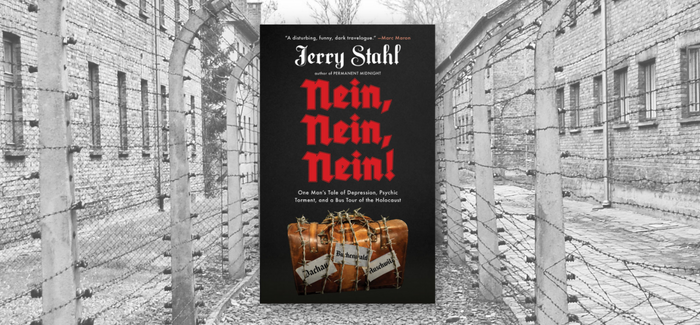Books
Jerry Stahl’s Bus Tour to Auschwitz
Nein, Nein, Nein! One Man’s Tale of Depression, Psychic Torment and A Bus Tour of the Holocaust
By Jerry Stahl (Akashic Books)
The writing that Jewish novelist, screenwriter and journalist Jerry Stahl loves best, he notes in the opening of his latest book, Nein, Nein, Nein!, is of the “unsayable,” writing that pursues the depth of words that make a reader squirm.
Nowhere is that more evident than in Nein, Nein, Nein, a memoir and travelogue.
Best known for Permanent Midnight, his harrowing memoir about drug addiction that was adapted into a 1998 film starring Ben Stiller, Stahl has worked for years in movies and television, including scripts for feature film Bad Boys II the TV series CSI and Escape at Dannemora (he received an Emmy nomination for the latter). The author of 10 books, including I, Fatty, about silent film actor Fatty Arbuckle, he has written for Esquire, The New York Times, Vice and a variety of other publications.
In 2016, with his depression at an all-time high and his career and personal life at an all-time low, Stahl decided to embark upon a two-week guided bus tour to several concentration camps in Poland and Germany. The journey became a six-part series for Vice magazine and, eventually, Nein, Nein, Nein!, where he explores in detail his time on the tour, his fellow travelers and the other tourists he meets at the camps as well as the entire idea of profit-making Holocaust tourism.

“It was one of the most depressing places on earth,” acknowledged the 68-year-old of visiting Auschwitz, in an interview with Hadassah Magazine. Speaking with his trademark self-deprecating acid wit, he said, “I was going because I come from a family of depressos and electroshock victims and suicides. As insane as this sounds, I wanted to go somewhere where that emotion was appropriate. I wanted to find the darkest thing.”
And, he added, “I think as you get older, even if you’re not a religious and a practicing Jew, there is something that calls you to visit this place.”
Stahl was deeply disturbed by what he saw at the concentration camps, both the places themselves and the reaction from those on the tour.
“To feel that sense of doom, that sense of torture—there was an enormous impact on me walking around,” he said. “Seeing the piles of glasses, the mountain of hair, their tiny little shoes—all the tiny details—was horrifying. And the fact that people could eat pizza or have a nosh on the very grounds where people were tortured and beaten was unfathomable to me.”
Nevertheless, Stahl writes, he grew to appreciate the experience of being on the bus with this group of people, even as he sardonically riffs on the teenagers taking selfies at Auschwitz, or the older tourists who sandwiched their trip through the death camps between a visit to Ireland and an Alaskan cruise.
Being one of the only two Jews on the bus with his tour group was eye-opening. “Needless to say, that ride was a whole other level of hell. I had a lot of bus trauma growing up, from my own public school years in Pittsburgh,” where he was the only Jew in his class, he quipped in an interview. On the tour bus, “when the group and I had conversations as to why we were there for the tour, it was a bizarre thing. They said things like, ‘I really admire the Jewish people,’ or, ‘I have watched Schindler’s List and I really liked the film.’ “
Stahl ultimately found the two-week experience to be “both depressing and yet massively liberating,”
“There is no aspect of our contemporary horror show that does not have parallels or connections to the Holocaust,” he said. “Even, believe it or not, abortion has its relevance. People forget that [Jewish] doctors, for example, at Auschwitz performed abortions on pregnant inmates, so their babies would be spared the horror of Josef Mengele’s experiments. Wheels with within wheels. You could say ‘Never Again.’ Or you can say, ‘Never Again. But sort of….’ ”
Stahl’s father was an immigrant from Lithuania who had come to the United States at the age of 10, fleeing pogroms, and Stahl weaves darkly humorous comments on his own life and family history throughout Nein, Nein, Nein! Indeed, writing this book, he said, forever changed his relationship with Judaism.
“My grandfather, rest his soul, had one nugget of wisdom he loved to march out,” he said. “On the subject of Judaism, his thinking was simple and diamond-sharp: ‘If you ever forget you’re a Jew, a gentile will remind you. Which means, among other things, even if you don’t think you have a relationship with Judaism, Judaism has got a relationship with you. And one way or another, you will be judged because of it.’ So the book really had me embrace who I am, wholly embracing my heritage.”
Susan L. Hornik is a veteran entertainment and lifestyle journalist.











 Facebook
Facebook Instagram
Instagram Twitter
Twitter
Leave a Reply